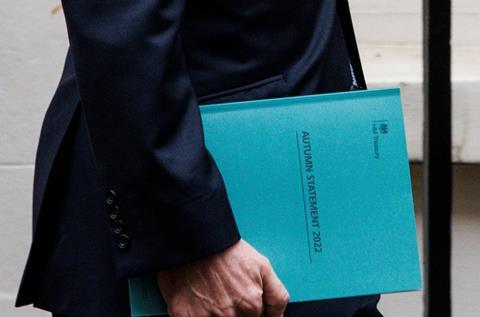The chancellor’s announcement of a further real-terms cut to the justice budget has left the sector facing ‘systemic failure’, says the Law Society. There are no more ‘savings’ to be made
Yesterday’s announcement that an already cash-strapped Ministry of Justice faces a real-terms spending cut next year has been roundly condemned by leaders of the legal profession. HM Treasury documents released after the chancellor’s autumn statement revealed that the MoJ’s day-to-day spending budget, £9.4bn for 2022/23 will rise by 4% in 2023/24 to £9.8bn. The following year will see the budget rise by just 2% to £10bn. The Office for Budget Responsibility predicts that the rate of inflation, currently over 11%, will slip to 7.4% next year.
Law Society vice president Nick Emmerson warned that the cuts would leave the justice system facing ‘systemic failure’.
‘Increased funding is vital to keep it functioning,’ he said. ‘There aren’t any more savings to be made in a justice system which is already breaking down after decades of underinvestment.’
Meanwhile, the Treasury revealed that the MoJ’s capital budget will rise by 35% in 2023/24 to £2.3bn before falling back in 2024/25 to £1.5bn.
Chancellor Jeremy Hunt claimed that government departments would cope with cuts through efficiency savings. A government ‘efficiency and savings review’ will include reprioritising spending away from lower-value and low-priority programmes, and reviewing the effectiveness of public bodies. The government will report on progress in the spring.
Elsewhere, in a plan for ‘stability, growth and public services’, the chancellor revealed that to boost the housing market, stamp duty land tax concessions would remain in place until 31 March 2025. The government will amend the Stamp Duty Land Tax (Reduction) Bill to implement this measure.
Treasury documents also restate the government’s ambition to reform retained EU law, especially in ‘key growth industries’ such as digital technology, life sciences, green industries, financial services, and advanced manufacturing.
'Recruiting more police and talking tough on crime will matter little if courts can’t deal with the volume of cases already going through the system, let alone many more'
Nick Emmerson, Law Society
Lobby group TheCityUK welcomed the ambition to make the UK the most innovative and competitive international financial centre: ‘It is vital that the government now remains focused on delivering much-needed economic stability and does not lose sight of the need to bolster UK growth and international competitiveness.’
As expected, the autumn statement announced tax rises for high earners, including introducing a £125,140 threshold for the highest rate of income tax and cuts in allowances for capital gains tax and dividends.
Law firm finance specialist Peter Noyce of accountant Menzies commented: ‘The budget will affect law firms as regards the tweaks around the edges in respect of freezing personal allowances and the reduction in the threshold at which point the highest rate of income tax is paid (if people are lucky to be above that bracket).

‘The chancellor has tried to at least give the impression that he is in control and bringing stability back, which if achieved means we are all in an arena that will perhaps not be quite so uncertain over the next couple of years; while not pretending there will not be bumps in the road. We are in a “Russian-made recession” after all.’
On the MoJ cuts, Emmerson said: ‘Courts are crumbling, dogged by delays, and there are chronic shortages of judges and lawyers as professionals leave this underpaid work in their droves. Duty schemes are failing, leaving the right to representation at police stations in peril. Recruiting more police and talking tough on crime will matter little if courts can’t deal with the volume of cases already going through the system, let alone many more. Criminals may instead be emboldened.’
The vice president repeated his call on the government for the immediate implementation of the increase recommended by the Bellamy review of criminal legal aid. ‘The cost-of-living crisis and public spending cuts mean more and more people will need legal help with life-changing issues such as homelessness and debt. But who is going to give that vital advice if there aren’t enough solicitors to meet the current demand? The government will be forced to pick up the pieces, at greater cost, further down the line.’
Bar chair Mark Fenhalls KC said: ‘While the chancellor rightly recognises health and education as vital public services to be adequately funded, it is a mistake not to see justice in the same light. The cost-of-living crisis means those most in need are now even more likely to require access to justice for help with housing, employment, debt and other essential legal issues.
‘The justice sector was one of the hardest hit by austerity cuts a decade ago and was only just beginning to rebuild. This real-terms cut could put us back at square one.’




































No comments yet